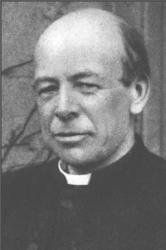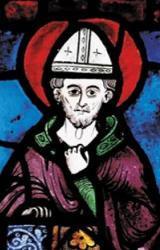Planning worship?
Check out our sister site, ZeteoSearch.org,
for 20+ additional resources related to your search.
- |
User Links
Person Results
John Milton

1608 - 1674 Scripture: Jeremiah 33:11 Author of "Let Us with a Gladsome Mind" in Praise for the Lord (Expanded Edition) Milton, John, was born in London, Dec. 9, 1608, and died there Nov. 8, 1674. His poetical excellences and his literary fame are matters apart from hymnology, and are fully dealt with in numerous memoirs. His influence on English hymn-writing has been very slight, his 19 versions of various Psalms having lain for the most part unused by hymnal compilers. The dates of his paraphrases are:—
Ps. cxiv. and cxxxvi., 1623, when he was 15 years of ago. These were given in his Poems in English and Latin 1645.
Ps. lxxx.-lxxxviii., written in 1648, and published as Nine Psalmes done into Metre, 1645.
Ps. i., 1653; ii., “Done August 8, 1653;" iii., Aug. 9, 1653; iv. Aug. 10, 1653; v., Aug. 12, 1653; vi., Aug. 13, 1653; vii.Aug. 14, 1653; viii., Aug. 14, 1653.
These 19 versions were all included in the 2nd ed. of his Poems in English and Latin, 1673. From these, mainly in the form of centos, the following have come into common use:—
1. Cause us to see Thy goodness, Lord. Ps. lxxxv.
2. Defend the poor and desolate. Ps. lxxxii.
3. God in the great assembly stands. Ps. lxxxii.
4. How lovely are Thy dwellings fair. Ps. lxxxiv. From this, "They pass refreshed the thirsty vale," is taken.
5. Let us with a gladsome [joyful] mind. Ps. cxxxvi.
6. O let us with a joyful mind. Ps. cxxxvi.
7. The Lord will come and not be slow. Ps. lxxxv.
Of these centos Nos. 4 and 5 are in extensive use. The rest are mostly in Unitarian collections. There are also centos from his hymn on the Nativity, "This is the month, and this the happy morn" (q.v.).
--John Julian, Dictionary of Hymnology (1907)
John Milton
Ralph Vaughan Williams

1872 - 1958 Person Name: Ralph Vaughan Williams, 1872-1958 Scripture: Jeremiah 33:2 Harmonizer of "WAS LEBET WAS SCHWEBET" in Singing the Faith Through his composing, conducting, collecting, editing, and teaching, Ralph Vaughan Williams (b. Down Ampney, Gloucestershire, England, October 12, 1872; d. Westminster, London, England, August 26, 1958) became the chief figure in the realm of English music and church music in the first half of the twentieth century. His education included instruction at the Royal College of Music in London and Trinity College, Cambridge, as well as additional studies in Berlin and Paris. During World War I he served in the army medical corps in France. Vaughan Williams taught music at the Royal College of Music (1920-1940), conducted the Bach Choir in London (1920-1927), and directed the Leith Hill Music Festival in Dorking (1905-1953). A major influence in his life was the English folk song. A knowledgeable collector of folk songs, he was also a member of the Folksong Society and a supporter of the English Folk Dance Society. Vaughan Williams wrote various articles and books, including National Music (1935), and composed numerous arrangements of folk songs; many of his compositions show the impact of folk rhythms and melodic modes. His original compositions cover nearly all musical genres, from orchestral symphonies and concertos to choral works, from songs to operas, and from chamber music to music for films. Vaughan Williams's church music includes anthems; choral-orchestral works, such as Magnificat (1932), Dona Nobis Pacem (1936), and Hodie (1953); and hymn tune settings for organ. But most important to the history of hymnody, he was music editor of the most influential British hymnal at the beginning of the twentieth century, The English Hymnal (1906), and coeditor (with Martin Shaw) of Songs of Praise (1925, 1931) and the Oxford Book of Carols (1928).
Bert Polman
Ralph Vaughan Williams
Henry Scott Holland

1847 - 1918 Person Name: Henry Scott Holland, 1847-1918 Scripture: Jeremiah 33:14-16 Author of "Judge Eternal, Throned in Splendour" in Common Praise (1998) Holland, Henry Scott, D.D., son of G. H. Holland of Gayton Lodge, Wimbledon Common, was born Jan. 27, 1847, at Ledbury, Hereford, and educated at Eton and at Balliol Coll., Oxford (B.A. 1870, M.A. 1873, D.D. Aberdeen 1903). He became Senior Student of Christ Church, Oxford, in 1870, was ordained D. 1872, P. 1874, and has been Canon of St. Paul's, London, since 1884. His hymn, "Judge eternal, throned in splendour" (Prayer for the Nation), appeared in the Commonwealth for July 1902, and is in The English Hymnal, 1906, No. 423. [Rev. James Mearns, M.A.]
--John Julian, Dictionary of Hymnology, New Supplement (1907)
Henry Scott Holland
Edward Jones
1761 - 1836 Person Name: Edward Jones, 1752-1824 Scripture: Jeremiah 33:14-16 Collector of "RHUDDLAN" in Common Praise (1998) Also: Edward Jones, Maesyplwm.
Edward Jones
Fulbert of Chartres

960 - 1028 Person Name: Fulbert of Chartres (?-1028) Scripture: Jeremiah 33:14-16 Author of "Ye Choirs of New Jerusalem" in Common Praise (1998) Fulbert of Chartres, Saint and Bishop (St. Fulbertus Carnotensis), flourished in the 11th century, having been consecrated Bishop of Chartres (probably) in 1007, and dying on April 10th, 1028. His collected works were published at Paris in 1608, but with the exception of one hymn, "Chorus novae Hierusalem" (q.v.), are very little known. That hymn in its original Latin form was included in the Sarum Breviary, and, in one English form or another, finds a place in most of our English Hymnals as "Ye choirs of New Jerusalem." [Rev. Digby S. Wrangham, M.A.]
--John Julian, Dictionary of Hymnology
Fulbert of Chartres
Robert Campbell
1814 - 1868 Person Name: Robert Campbell (1814-1868) Scripture: Jeremiah 33:14-16 Translator of "Ye Choirs of New Jerusalem" in Common Praise (1998) Robert Campbell was an advocate residing in Edinburgh. He is not much known as an author, but some of his hymns have been adopted in several hymnals. He was Roman Catholic. His death occurred in 1868.
--Annotations of the Hymnal, Charles Hutchins, M.A. 1872.
====================
Campbell, Robert. Advocate, of Sherrington, Scotland, was born at Trochmig, Ayrshire, Dec. 19, 1814. When quite a boy he attended the University of Glasgow. Though showing from his earliest years a strong predilection for Theological studies, eventually he fixed upon the Scottish law as a profession. To this end he entered the Law Classes of the University of Edinburgh, and in due course entered upon the duties of an advocate. Originally a Presbyterian, at an early age he joined the Episcopal Church of Scotland. He became a zealous and devoted Churchman, directing his special attention to the education of the children of the poor. His classical attainments were good, and his general reading extensive. In 1848 he began a series of translations of Latin hymns. These he submitted to Dr. Neale, Dr. Mills of Ely, and other competent judges. In 1850, a selection therefrom, together with a few of his original hymns, and a limited number from other writers, was published as Hymns and Anthems for Use in the Holy Services of the Church within the United Diocese of St. Andrews, Dunkeld, and Dunblane. Edinburgh, R. Lendrum & Co.
This collection, known as the St. Andrews Hymnal, received the special sanction of Bishop Torry, and was used throughout the Diocese for some years. Two years after its publication he joined the Roman Catholic Church. During the next sixteen years he devoted much time to the young and poor. He died at Edinburgh, Dec. 29, 1868.
From his collection of 1850, four translations were given in Hymns Ancient & Modern, 1861, "At the Lamb's high feast we sing;" “Come, pure hearts, in sweetest measures;" "Ye Choirs of New Jerusalem;" " Ye servants of a martyr'd God" (altered). Attention was thereby directed to his translations. They are smooth, musical, and well sustained. A large number, not included in his 1850 collection, were left by him in manuscript. From these Mr. O.Shipley has printed several in his Annus Sanctus, 1884. (C. MSS.)
--John Julian, Dictionary of Hymnology (1907)
Robert Campbell
Henry J. Gauntlett

1805 - 1876 Person Name: Henry John Gauntlett (1805-1876) Scripture: Jeremiah 33:14-16 Composer of "ST. FULBERT" in Common Praise (1998) Henry J. Gauntlett (b. Wellington, Shropshire, July 9, 1805; d. London, England, February 21, 1876) When he was nine years old, Henry John Gauntlett (b. Wellington, Shropshire, England, 1805; d. Kensington, London, England, 1876) became organist at his father's church in Olney, Buckinghamshire. At his father's insistence he studied law, practicing it until 1844, after which he chose to devote the rest of his life to music. He was an organist in various churches in the London area and became an important figure in the history of British pipe organs. A designer of organs for William Hill's company, Gauntlett extended the organ pedal range and in 1851 took out a patent on electric action for organs. Felix Mendelssohn chose him to play the organ part at the first performance of Elijah in Birmingham, England, in 1846. Gauntlett is said to have composed some ten thousand hymn tunes, most of which have been forgotten. Also a supporter of the use of plainchant in the church, Gauntlett published the Gregorian Hymnal of Matins and Evensong (1844).
Bert Polman
Henry J. Gauntlett
R. B. Y. Scott
1899 - 1987 Person Name: R. B. Y. Scott (1899-1987) Scripture: Jeremiah 33:14-16 Author of "O Day of God, Draw Nigh" in Common Praise (1998) Scott, Robert Balgarnie Young. (Toronto, Ontario, July 18, 1899--November 1, 1987). United Church. University of Toronto, B.A., 1922; M.A., 1924; Ph.D., 1928. Pastorate at Long Branch, Ont., 1926-1928; professor of Old Testament at Union College (Vancouver), 1928-1931; United Theological College (Montreal), 1931-1955; Princeton University, 1955-1968; also dean of divinity at McGill University (Montreal), 1945-1955. Published many translations of, and commentaries on, Old Testament material, as well as on the Dead Sea Scrolls. Most of his hymns date from his years in Montreal.
--Hugh D. McKellar, DNAH Archives
R. B. Y. Scott
James Hopkirk
1908 - 1972 Person Name: James Hopkirk, 1908-1972 Scripture: Jeremiah 33:14-16 Composer of "BELLWOODS" in Common Praise (1998)
James Hopkirk
William Mercer
1811 - 1873 Person Name: William Mercer, 1811-1873 Scripture: Jeremiah 33:14-16 Translator and Adapter of "How Bright Appears the Morning Star" in Common Praise (1998) Mercer, William, M.A., born at Barnard Castle, Durham, 1811, and educated at Trinity College, Cambridge (B.A., 1835). In 1840 he was appointed Incumbent of St. George's, Sheffield. He died at Leavy Greave, Sheffield, Aug. 21, 1873. His principal work was:—-
The Church Psalter and Hymn Book, comprising The Psalter, or Psalms of David, together with the Canticles, Pointed for Chanting; Four Hundred Metrical Hymns and Six Responses to the Commandments; the whole united to appropriate Chants and Tunes, for the use of Congregations and Families, by the Rev. William Mercer, M.A. . .. Assisted by John Goss, Esq…., 1854; enlarged 1856; issued without music, 1857; quarto edition 1860; rearranged edition (Oxford edition) 1864; Appendix 1872.
For many years this collection was at the head of all the hymn-books in the Church of England, both in circulation and influence. Its large admixture of Wesleyan hymns, and of translations from the German gave it a distinct character of its own, and its grave and solemn music was at one time exceedingly popular. To it Mercer contributed several translations and paraphrases from the Latin and German, the latter mainly from the Moravian hymn-books; but his hymn-writing was far less successful than his editing, and has done nothing to increase his reputation.
-- John Julian, Dictionary of Hymnology (1907)
William Mercer


 My Starred Hymns
My Starred Hymns


